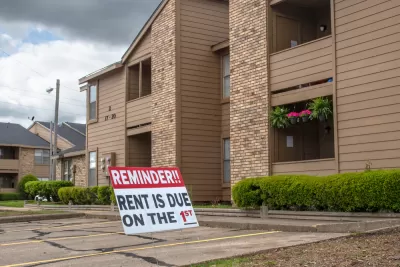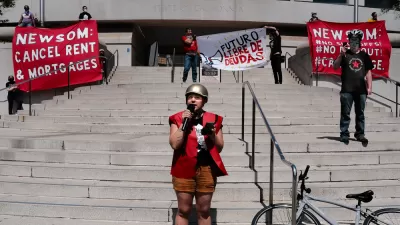The day that renters relying on public support to pay the bills have been dreading since March arrives tomorrow.

"A federal moratorium that has protected millions of renters from eviction since late March expires Friday [July 24], leaving millions of people at risk even as the coronavirus continues to spread across the country," reports Renae Merle.
"The moratorium covers renters who live in homes with federally backed mortgages, which the Urban Institute estimates to be 12.3 million households, or about 30 percent of all renters nationwide," according to Merle. "Once the moratorium lapses, landlords can give their delinquent tenants 30 days’ notice and then begin filing eviction paperwork in late August."
The article includes expert insight about the potential for the end of the moratorium to cause a wave of evictions and economic struggles in the country, adding to the evictions and housing insecurity already facing renters and property owners all over the country. The U.S. Department of Housing and Urban Development recently announced a housing toolkit to offer support for renters and property owners covered by the federal eviction moratorium, in anticipation of Friday's expiration date.
As noted by Merle, the U.S. House of Representatives approved $100 billion in renter relief as part of the Health and Economic Recovery Omnibus Emergency Solutions (HEROES) Act, which the Senate has yet to consider. "Last week, Sen. Kamala D. Harris (D-Calif.) unveiled a sweeping housing plan that would ban evictions and foreclosures for a year while giving tenants up to 18 months to pay back missed payments," according to Merle. Information about the legislation proposed by Senate Harris is available in an article by Katy O'Donnell.
FULL STORY: A federal eviction moratorium ends this week, putting 12 million tenants at risk

Maui's Vacation Rental Debate Turns Ugly
Verbal attacks, misinformation campaigns and fistfights plague a high-stakes debate to convert thousands of vacation rentals into long-term housing.

Planetizen Federal Action Tracker
A weekly monitor of how Trump’s orders and actions are impacting planners and planning in America.

Chicago’s Ghost Rails
Just beneath the surface of the modern city lie the remnants of its expansive early 20th-century streetcar system.

Bend, Oregon Zoning Reforms Prioritize Small-Scale Housing
The city altered its zoning code to allow multi-family housing and eliminated parking mandates citywide.

Amtrak Cutting Jobs, Funding to High-Speed Rail
The agency plans to cut 10 percent of its workforce and has confirmed it will not fund new high-speed rail projects.

LA Denies Basic Services to Unhoused Residents
The city has repeatedly failed to respond to requests for trash pickup at encampment sites, and eliminated a program that provided mobile showers and toilets.
Urban Design for Planners 1: Software Tools
This six-course series explores essential urban design concepts using open source software and equips planners with the tools they need to participate fully in the urban design process.
Planning for Universal Design
Learn the tools for implementing Universal Design in planning regulations.
planning NEXT
Appalachian Highlands Housing Partners
Mpact (founded as Rail~Volution)
City of Camden Redevelopment Agency
City of Astoria
City of Portland
City of Laramie





























